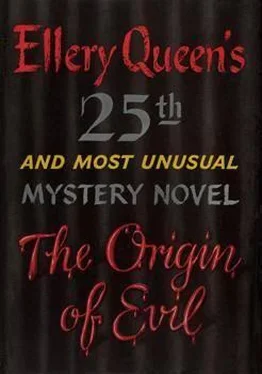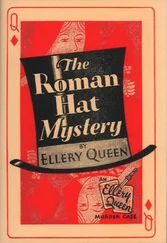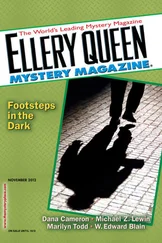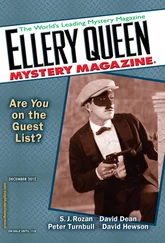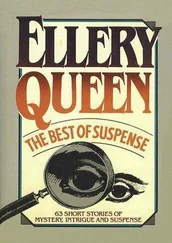“Here he is―”
“Ah.”
Ellery took the book.
The illustration showed a small, almost dumpy, dog with short legs, pendulous ears, and a wiry upcurving tail. The coat was smooth. Hindlegs and forequarters were an off-white, as was the muzzle; the little dog had a black saddle and black ears with secondary pigmentation of yellowish brown extending into his tail.
The caption under the illustration said: Beagle.
“Beagle.” Ellery glared. “Beagle... Of course. Of course. No other possibility. None whatever. If I’d had the brain of a wood louse... Beagle, Laurel, beagle!” And he swept her off her feet and planted five kisses on the top of her wet head. Then he tossed her on her unmade bed and before her horrified eyes went into a fast tap ― an accomplishment which was one of his most sacred secrets, unknown even to his father. And Ellery chanted, “ Merci my pretty one, my she-detective. You have follow ze clue of ze ar-sen-ique, of ze little frog, of ze wallette, of ze everysing but ze sing you know all ze time ― zat is to say, ze beagle. Oh, ze beagle!” And he changed to a soft-shoe.
“But what’s the breed of dog got to do with anything, Ellery?” moaned Laurel. “The only connection I can see with the word ‘beagle’ is its slang meaning. Isn’t a ‘beagle’ a detective?”
“Ironic, isn’t it?” chortled Ellery; and he exited doing a Shuffle-Off-to-Buffalo, blowing farewell kisses and almost breaking the prominent nose of Mrs. Monk, Laurel’s housekeeper, who had it pressed in absolute terror to the bedroom door.
Twenty minutes later Ellery was closeted with Lieutenant Keats at the Hollywood Division. Those who passed the closed door heard the murmur of the Queen voice, punctuated by a weird series of sounds bearing no resemblance to Keats’s usual tones.
The conference lasted well over an hour.
When the door opened, a suffering man appeared. Keats looked as if he had just picked himself up from the floor after a kick in the groin. He kept shaking his head and muttering to himself. Ellery followed him briskly. They vanished in the office of Keats’s chief.
An hour and a half later they emerged. Keats now looked convalescent, even robust.
“I still don’t believe it,” he said, “but what the hell, we’re living in a funny world.”
“How long do you think it will take, Keats?”
“Now that we know what to look for, not more than a few days. What are you going to do in the meantime?”
“Sleep and wait for the next one.”
“By that time,” grinned the detective, “maybe we’ll have a pretty good line on this inmate.”
They shook hands solemnly and parted, Ellery to go home to bed and Keats to set the machinery of the Los Angeles police department going on a twenty-four hour a day inquiry into a situation over twenty years old... this time with every prospect of success.
In three days not all the moldy threads were gathered in, but those they had been able to pick up by teletype and long distance phone tied snugly around what they already knew. Ellery and Keats were sitting about at the Hollywood Division trying to guess the lengths and textures of the missing ends when Keats’s phone rang. He answered it to hear a tense voice.
“Lieutenant Keats, is Ellery Queen there?”
“It’s Laurel Hill for you.”
Ellery took the phone. “I’ve been neglecting you, Laurel. What’s up?” Laurel said with a rather hysterical giggle, “I’ve committed a crime.”
“Serious?”
“What’s the rap for lifting what doesn’t belong to you?”
Ellery said sharply, “Something for Priam again?”
He heard a scuffle, then Crowe Macgowan’s voice saying hastily, “Queen, she didn’t swipe it. I did.”
“He did not!” yelled Laurel. “I don’t care, Mac! I’m sick and tired of hanging around not knowing―”
“Is it for Roger Priam?”
“It is,” said Macgowan. “A pretty big package this time. It was left on top of the mailbox. Queen, I’m not giving Roger a hold over Laurel. I took it and that’s that.”
“Have you opened it, Mac?”
“No.”
“Where are you?”
“Your house.”
“Wait there and keep your hands off it.” Ellery hung up. “Number six, Keats!”
They found Laurel and Macgowan in Ellery’s living room, hovering hostilely over a package the size of a men’s suit box, wrapped in strong Manila paper and bound with heavy string. The now-familiar shipping tag with Priam’s name lettered on it in black crayon ― the now-familiar lettering ― was attached to the string. The package bore no stamps, or markings of any kind.
“Delivered in person again,” said Keats. “Miss Hill, how did you come to get hold of this?”
“I’ve been watching for days. Nobody tells me anything, and I’ve got to do something . And, darn it, after hours and hours of hiding behind bushes I missed her after all.”
“Her?” said Crowe Macgowan blankly.
“Well, her, or him, or whoever it is.” Laurel turned old rose.
Crowe stared at her.
“Let’s get technical,” said Keats. “Go ahead and open it, Macgowan. Then we won’t have to lie awake nights with a guilty conscience.”
“Very humorous,” mumbled Delia’s son. He snapped the string and ripped of! the wrapping in silence.
The box was without an imprint, white, and of poor quality. It bulged with its contents.
Mac removed the lid.
The box was crammed with printed documents in a great variety of sizes, shapes, and colored inks. Many were engraved on banknote paper.
“What the devil.” Keats picked one out at random. “This is a stock certificate.”
“So is this,” said Ellery. “And this...” After a moment they stared at each other. “They all seem to be stock certificates.”
“I don’t get it.” Keats worried his thumbnail. “This doesn’t fit in with what you figured out, Queen. It couldn’t.”
Ellery frowned. “Laurel, Mac. Do these mean anything to you?” Laurel shook her head, staring at a name on the certificate she had picked up. Now she put it down, slowly, and turned away.
“Why, this must represent a fortune,” exclaimed Crowe. “Some warning!”
Ellery was looking at Laurel. “We’d better have a breakdown on the contents of this box, Keats, and then we can decide how to handle it. ― Laurel, what’s the matter?”
“Where you going?” demanded Macgowan.
Laurel turned at the door. “I’m sick of this. I’m sick of the whole thing, the waiting and looking and finding and doing absolutely nothing. If you and the lieutenant have anything, Ellery, what is it?”
“We’re not through making a certain investigation, Laurel.”
“Will you ever be?” She said it drearily. Then she went out, and a moment later they heard the Austin scramble away.
About seven o’clock that evening Ellery and Keats drove up to the Priam house in Keats’s car, Ellery carrying the box of stock certificates. Crowe Macgowan was waiting for them at the front door.
“Where’s Laurel, Mac? Didn’t you get my phone message?” said Ellery.
“She’s home.” Crowe hesitated. “I don’t know what’s the matter with her. She’s tossed of! about eight Martinis and I couldn’t do a thing with her. I’ve never seen Laurel act like that. She doesn’t take a drink a week. I don’t like it.”
“Well, a girl’s entitled to a bender once in a while,” jeered Keats. “Your mother in?”
“Yes. I’ve told her. What did you find out?”
“Not much. The wrappings and box were a washout Our friend likes gloves. Did you tell Priam?”
“I told him you two were coming over on something important. That’s all.”
Читать дальше
